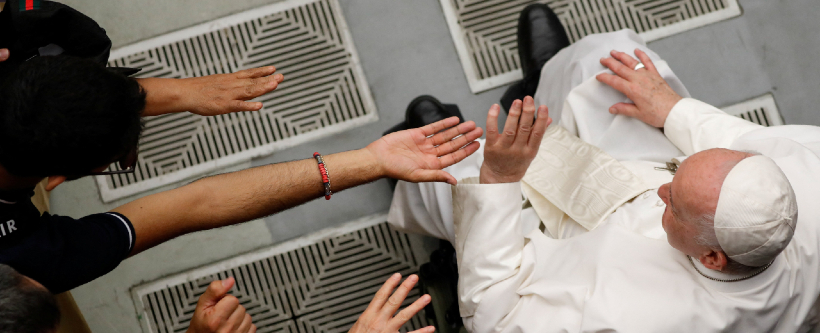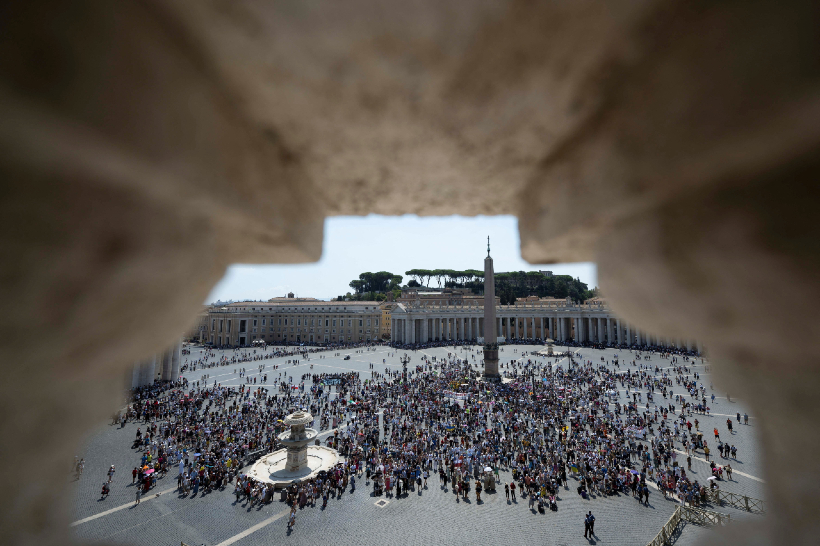Pope at general audience: taking upon ourselves the name of God
At his General Audience of August 22, Pope Francis reflected on the Second Commandment – “You shall not invoke the name of the Lord, your God, in vain.”
Dear brothers and sisters: In our continuing catechesis on the Ten Commandments, we now turn to the commandment: “You shall not take the name of the Lord your God in vain” (Ex 20:7). In the Bible, a name often embodies the deepest reality of a person. God’s name, revealed to Moses, is supremely holy, and thus never to be profaned or misused. In Judaism, the sacred Name is solemnly invoked on the feast of Yom Kippur to beg God’s mercy and forgiveness. Christians are baptized in the name of the Triune God, Father, Son and Holy Spirit. God’s name is thus “taken”, not in vain, but as the pledge of our redemption and rebirth as adoptive sons and daughters in Christ. Each day we take God’s name upon us anew, when we pray the petition of the Lord’s Prayer: “Hallowed be thy Name”. We ask that by our lives, and the witness of the Church, his name may be ever better known and loved. May we always invoke God’s holy name with reverence, as a sign of our special relationship to him, who in Christ took upon himself our sins and showed us the depth of his eternal mercy and love. (From: https://w2.vatican.va/content/francesco/en/audiences/2018/documents/papa-francesco_20180822_udienza-generale.html)
“You shall not invoke the name of the Lord, your God, in vain. For the Lord will not leave unpunished anyone who invokes his name in vain” (Ex 20,7).
Pope Francis dedicated his catechesis of this week’s Wednesday’s general audience to the second commandment, saying it is an “invitation not to offend the name of God and to avoid using it inappropriately.”
The translation of the expression, “You shall not invoke”, in Hebrew as well as in Greek literally means, “you will not take upon yourself, you will not assume “.
The expression “in vain” is clearer and means, “uselessly, vainly”. It refers to an empty shell, a form without content. It is hypocrisy, formality, a lie.
Knowing God changes life
The name in the Bible, the Pope explained, is the intimate truth of things and especially of people, often representing a mission. Thus Abraham in the Book of Genesis and Simon Peter in the Gospel receive a new name to indicate the change in direction in their lives. Knowing truly the name of God leads to the transformation of one’s life, like the moment Moses came to know the name of God his history changed.
Explaining a Jewish ritual, the Pope said that the name of God is solemnly proclaimed on the Great Day of Forgiveness, and the people are forgiven because through the name they come into contact with the very life of God who is mercy.
Thus “taking upon oneself the name of God “, the Pope said, means taking upon ourselves His reality, entering into a strong relationship, close to Him. For us Christians, he continued, this commandment is a call to remind ourselves that we are baptized “in the name of the Father and of the Son and of the Holy Spirit”, as we affirm every time we make the sign of the cross upon ourselves, to live our daily actions in heartfelt and real communion with God, that is, in his love.
Hypocrisy
One can ask oneself, “Is it possible to take upon oneself the name of God in a hypocritical way, like a formality, uselessly?” Unfortunately, the Pope said, the answer is positive: yes one can. One can live a false relationship with God, and this Word of the Ten Commandments is precisely the invitation to a relationship with God without any hypocrisy, a relationship in which we entrust ourselves to Him with all that we are. Unless we risk living with the Lord, touching with our hand the life that is in Him, it will only be theory.
The Pope said that Christianity touches the heart. The saints are so capable of touching the heart because in them we see what our hearts deeply desire: authenticity, true relationships, “radicality”. The Pope said this is also what we see in the “saints next door”, such as parents who give their children the example of a coherent, simple, honest and generous life.
Christian life manifests God’s name
If the number of Christians who take upon themselves the name of God without falsehood were to grow by practising the first request of the Our Father prayer, “Hallowed be Thy name”, the Pope pointed out, then the proclamation of the Church would be more heard and credible. If our concrete life manifests the name of God, he said, we will see how beautiful Baptism is and the great gift the Eucharist is, and what a sublime union there is between our body and the Body of Christ – He in us and we in Him!
From cross of Christ, no one can ever despise himself and think badly about one’s own existence, no matter what one has done. The name of each of us is on the shoulders of Christ. The Pope said, it is worth taking upon ourselves the name of God because He took upon Himself our name to the end, including the evil in us, to put His love in our hearts. That is why, the Holy father said, in this commandment God proclaims: “Take me upon yourself, for I have taken you upon me.”
The Pope said that anyone in whatever situation can invoke the holy name of the Lord, who is faithful and merciful Love. God never says “no” to a heart that sincerely invokes Him, the Pope added.
By Robin Gomes
22 August 2018, 10:11






Facebook Comments